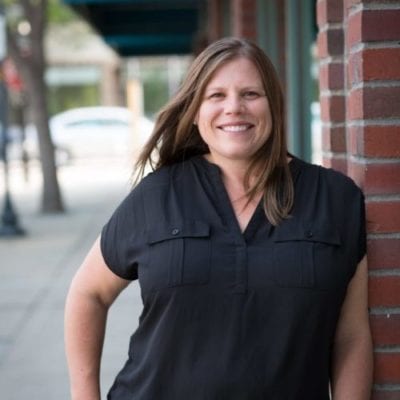Courage, Coaching, and Kata with Susan Clancy | 088
Welcome to Lean Leadership for Ops Managers, the podcast for leaders in Ops Management who want to spark improvement, foster engagement, and boost problem solving – AND still get their day job done. Here’s your host, Leadership Trainer, Lean Enthusiast, and Spy Thriller Junkie, Jamie V. Parker.
Jamie: [00:00:28] That’s Jamie here. And we are continuing our April Kata series with another Kata Con 8 in person interview with one of my favorite topics, coaching. That’s right. We talk about Improvement Kata, and you’ve heard those four steps. We set a challenge, a direction. We grasp the current condition. We establish the next target condition, and then we experiment toward the next target, repeating that four step cycle.
And when we really enhance that with coaching, we really typically do that in a learning group. And a learning group consists of the learner. That’s the learner doing the improvement. You heard me talk about my experience is being a learner and really learning the improvement and practicing the scientific thinking in some previous podcast episodes. So you can check those out. We’ll link them in the show notes.
In addition to the learner, you have a coach and the coach is responsible for coaching the learner. And then there’s a second coach and the second coach coaches the coach. So today we’re going to talk with Susan Clancy of the Kata Girl Geeks. So you’ll hear it abbreviated as KGG.
So the Kata Girl Geeks where she has served and learner roles as well as in coach roles. And we’re going to talk about some cool experiences she was going through in real time at the time that we talked. Like I grabbed her in the hallways like, Hey, Susan, come talk about this.
And then after that, stick around because I’m going to share more about my experience participating in a session of the coaching dojo, the Kata Coaching Dojo with Tilo Schwartz and Tracy Defoe. All right, let’s dive in. All right. So I am at Kata-Con here at Jekyll Island with Susan Clancy on, by the way, St Patrick’s Day. Susan is here from Ireland, came over the pond. So,
Jamie: [00:02:15] Susan, thank you so much for joining this conversation.
Susan: [00:02:18] Thank you, Jamie. Delighted to be here.
Jamie: [00:02:20] So you have been doing something quite interesting at Kata Con 8 where you have been a learner and having learning cycles and coaching cycles with working towards a challenge and doing it in front of everybody.
Susan: [00:02:33] Absolutely.
Jamie: [00:02:34] Yes. So tell us a little bit about what is this challenge that you’re working on here live at Kata Con?
Susan: [00:02:39] Yeah, wonderful. So, yeah, maybe it’s probably a good idea for us to give you the vision of the KGG. So I’m here as a learner representing the KGG, and we’re really lucky that Lean Frontiers have offered us this opportunity to go through ten coaching cycles between today and tomorrow, up to 5:00 tomorrow. And the KGG has an amazing vision that they are a trailblazing worldwide learning community of generous women exploring, activating and accelerating scientific thinking in individuals, communities and in organizations having a positive impact on each other and our world. And we’re certainly trailblazing here at Kata Con 8.
Jamie: [00:03:27] Yes, yes we are.
Susan: [00:03:29] So the challenge that we’re working on over these ten cycles is wouldn’t it be wonderful if by 5 p.m. tomorrow ten new global learning groups are established with the date and time of their first coaching cycle on their calendars? So the Kata Con 8 builds community and creates personal connections, enabling people to deepen their Kata skills and develop strong scientific thinking mindsets.
Jamie: [00:03:57] All right, hold up. Pause. Jamie, back. We’re going to take a short time out from that discussion to make a couple of call outs about Susan’s challenge statement. So remember that challenge statement she just she just shared and I want to share with you a few points so that when you’re writing challenge statements, you can keep this in mind. So Susan started with wouldn’t it be wonderful if. Sometimes we hear that as. Wouldn’t it be great if. Wouldn’t it be awesome if. And that’s a great way to start a challenge statement and start thinking about the possibility. Wouldn’t it be wonderful if.
Then you also heard an achieve by date. And in this case, because this all happened over a couple of days, there was a time as well by 5 p.m. So you heard the achieved by date and then what are we trying to achieve? And Susan talks about learning groups.
That’s the what she’s trying to achieve, but she doesn’t just stop there because you also heard her share some measures of success. She has the the quantity ten groups. Right. That’s that’s a measure of success. But she also has some other descriptive measures of success, some other definitions about what it means.
For example, you heard her say how with the first meeting set up or scheduled. And then at the end, did you catch the last part? She shared the why it matters. The so what? So that what happens? So what’s the what’s the reason that makes this challenge worthwhile? Kind of really helps you stay grounded in why the challenge matters.
All right. I just wanted to point that out for those of you who are working on challenges so that you can hear that. We’ll head on back to the conversation.
Jamie: [00:05:34] Wow. Okay. So this is a pretty big challenge because setting up ten learning groups is not an easy thing to do, because you have to have a learner, you’ve got to have coach, you got to have a second coach. And I know that KGG kata girl geeks has, you know, like we’ve had some standards about what it means and what you need to have done and achieved in order to be in a coach role or a second coach role on top of it.
Susan: [00:05:56] Yes, absolutely. And we brought that criteria today to Kata Con. So where we specified that if you’re signing up to be a learner, you know, the limitations around that are there are none. And if you’re signing up to be a coach that you have followed the starter Kata. Exactly. For 90 cycles.
Jamie: [00:06:20] Wow. 90 cycles. Yeah.
Susan: [00:06:22] At a minimum. And if you want to be a second coach then you follow the starter Kata as a second coach. Uh, for a minimum of 90 cycles.
Jamie: [00:06:32] Yes. And so this is really interesting because I think for a lot of people what they do is they jump straight to coaching or second coaching having never been a learner. So tell me, why do you think it’s so important for people to be a learner before they jump into coaching?
Susan: [00:06:45] Well, Kata Con and it’s been, you know, repeated several times today and in the history of Kata Con is have a coach, be a coach. And that’s hugely important. And and, you know, being a learner first is just a really, really good way to develop scientific thinking and then enable you to be able to coach a learner, to be able to think scientifically, to develop their skills and capabilities. So it’s a must have. And yeah, it’s a criteria we’ve asked for here today. It’s a criteria we follow with the learning groups and we get amazing coaches and second coaches and scientific thinkers at the other end of it. So it’s well worth it.
Jamie: [00:07:30] All right. I’m hitting that pause button for a second, guys. I’m back. That’s right. I am back. And I want to I want to call this this conversation out just a minute about the criteria for coaches. This thing Susan and I are talking about here. And the reason I want to do that is I just want to share with you that I didn’t I don’t think I quite understood the importance of this until I saw it play out.
So I was in the situation where I was watching a observing a Kata class, a Kata coaching class. And so in it they was teaching, you know, the Kata of coaching routines and skills, and most of the participants were Kata coaches back in their workplaces like they were actively serving in coach roles for Kata learners.
And but most of them had actually never really been learners themselves. They kind of maybe dabbled with it, but they hadn’t been a learner doing a real challenge with a coach, kind of challenging them and supporting them and engaging with them. And it was like a drastic difference compared to the coaching cycles I observe at the KGG Kata Girl Geeks. So it was really interesting to me because I don’t think I quite recognized how important this was until I saw it.
Jamie: [00:08:45] Like when I was watching these coaches who, you know, were coming from all different organizations across the country. It’s not like, Oh, this organization is missing the boat. It’s a very common experience. I guarantee you. It’s what I would have looked like, you know, back in, I don’t know, six years ago or seven years ago, whenever it was, I tried to jump in and be a coach. But when somebody just tries to jump in and be a coach without having been the learner, without really grasping all the scientific thinking, without being able to have seen a coach modeling how to coach all of that, it just it just didn’t go as well.
And so I just want to share that because it was an aha moment for me. So I wanted to share that moment for you as well. All right. End rant. Back to Susan.
Jamie: [00:09:28] All right. So then you’re doing these ten live coaching cycles. You’re the learner. You are up on stage in front of, you know, 90 people. Tell me about this experience. What’s it like? What are you feeling up there?
Susan: [00:09:39] Well, first of all, I have I don’t think I’ve ever in my whole life being been on stage in front of 100 people in another country and not even in Ireland. So that’s a first. Secondly, I’ve never done a physical coaching session. Yeah. As a coach to learn.
Jamie: [00:09:57] About that because I’ve seen you do them with Gemma in Kata of kicks, but they have been all.
Susan: [00:10:02] Virtual. Yes, they have. Yeah. So as a learner, I’ve been coached virtually and as a coach I’ve coached virtually. So it was yeah, it was it was never physical. So that was another thing. And of course I thought, what if I get stage fright? What if I you know, what if I forget what to say? What if I freeze up? But it was so weird. It was like an out-of-body experience. And I suppose it just shows the power of connection. So I’m very lucky.
I’ve worked with Gemma and Julie and you know, for a while now. And the minute Gemma started the connect first and then coach, the minute she said, you know, how are you doing? It’s like the room disappeared. It was just me and Gemma up there with the storyboards and Julie having our backs and making sure, you know, we were, you know, we were doing our best. And it was just an amazing experience. And, uh, the coaching cycle, you know, just, just was my focus. And I didn’t think of the audience, you know, so it was wonderful.
Jamie: [00:11:05] Yes. Well, I know it takes a ton of courage to do that. So I just want to celebrate you for standing up and doing that in front of folks. And I also think it’s just so valuable because it is not a common experience for people to be able to see this happening with a real challenge, with real next steps, with real learning, and to be able to do that in a safe environment like this, it just it’s not a common experience. And so for Lean Frontiers and for you all to have kind of flown across the pond and do this, do these ten cycles in front of people is just fantastic. What a quality experience.
Susan: [00:11:36] Yeah, well, it’s wonderful because, you know, my mission personally is to create people empowered environments. That’s what I’m all about, that that’s why I exist, that’s what I strive to do, is I call myself sometimes the Florence Nightingale of industry. But I want to give you know, I want to give people the opportunity to have a pleasant working environment.
And and for that, if we’re coaching, we need to protect the learner. So I’m using this opportunity to show folks today that it is important to protect the learner, to develop their scientific thinking and skills and their capabilities, of course. But but but keep them within the guardrails. Like, mind them, look after them.
And so I’m showing some vulnerabilities today and just, you know, just trying to showcase to people that it is hard being a learner. And I’m trying to exhibit some of that today for folks who are new to Kata, for folks who maybe are already coaching, just to tune them in again, to the importance of, you know, developing the skills and capabilities of the learner, but also protecting them and connecting with them and building that relationship.
Jamie: [00:12:53] So, yes, well, this is fantastic. I love what you’re doing. It’s so fun to watch. Thank you so much for coming over and chatting about it, just to be able to share that with other folks that are listening that aren’t here, here in person.
Susan: [00:13:05] Sure. Jamie and absolutely delighted to meet you in person for the first time. I’m a big fan.
Jamie: [00:13:10] As you know. I am so excited to meet you too. Yeah, it has been the best, like day and a half so far of hugs and wonderful.
Susan: [00:13:18] Yeah, yeah. We’re really good friends that, like, I feel like I’ve known all my life, such as the power of Kata. I think it’s, you know, it’s it’s that practice that just brings us all so close together and the community of the KGG, which is just trailblazing and will continue to trail, please.
Jamie: [00:13:34] So, yes, absolutely. Thank you.
Susan: [00:13:37] Jamie. Thank you.
Jamie: [00:13:41] All right. I am grateful for Susan for joining the show to talk about her experience. And, you know, of course, for Susan and Gemma and Julie for modeling ten coaching cycles at Kata Con eight and of course, all their contributions to the girl geeks. As you can imagine, I’m a big believer in development and coaching, and that includes me.
I have a coach that I work with in my business. In my life, I kind of go on and off working with different life coaches with different focus areas. I’m exploring possibly working with a speaking coach right now. This is actually really fun and exciting to look at those opportunities and possibilities. And then I also take lots of training and development programs for my own skills.
So I was absolutely thrilled to explore the coaching dojo with Tilo Schwartz and Tracy Defoe at Kata Con eight. Over the last nine months, I’ve heard Tracy talk about the dojo. Literally wrote the book on the Kata coaching dojo. And I own the book. I’ve flipped through it. But to be frank, it was, you know, still a little elusive to me. You know, I understood that the dojo is the room where martial arts is practiced. And in that sense, it’s creating the gym for practicing coaching routines. Right. You know, for your workouts, right. And like a gym, we want to create the dojo in a way where people can go every day or every week versus just a one off training class for 4 hours, never to return again. But I still just didn’t quite get it.
Jamie: [00:15:06] Like, I don’t quite get it. And that is why I’m so glad I attended this. The coaching dojo itself focuses on coaching beyond the prescribed code of coaching questions. So listening to the answers, deciding whether to move on to the next question or whether to stay on this question and respond. And if you do stay in respond, how do you respond? Right. And this was awesome because this is the part of the art of coaching that’s kind of a little harder to put into a science or a process.
And Tilo’s Dojo really helped to bring more process to this whole coaching as he really identified patterns and broke them down. So if you’re wanting to grow specifically as a Kata coach, then sign up for the dojo. I am pretty sure I will be signing up for the next one this fall just so that I can get the full experience.
Now, with all that, here’s a thing for me. My little mini dojo experience goes well beyond kata and well beyond coaching. You see, Tilo is a German engineer, and what he showed me in those 3 hours was how he deconstructed what he was observing and coaching interactions and coaching cycles, how he identified patterns and how he reconstructed it in a way of teaching and practicing to build habits and skills.
What he showed me was how to break down big ideas and big skill sets and to practice a bold components. What he showed me was how to take soft skills, air quotes, soft skills, you know, like conflict and encouragement and empathy that we have in our human interactions with people at work and how I could do the same thing that he did with coaching Kata with these skills to help my clients.
You know, we all know that we’re supposed to be kind and we’re supposed to show respect and we’re supposed to listen to understand. Right. Cool. I don’t need someone to tell me that’s important. I agree. That’s important. But in the thick of it, when emotions are running high and when we have uncertainty and we have the pressure to deliver results and I’m interacting with another human being on my team. Help me in that moment, because those are the moments that the managers at my client organizations, that’s what they need help with. And now I have a better understanding of how to help more effectively.
It’s still going to take time and practice and iteration, but I have no doubt that my three hour dojo experience with Tilo and Tracy will make me a better business partner. Leader. Consultant. Trainer, mentor. Coach. So thank you, Tilo. And thank you, Tracy.
And with that, this wraps up our three part Kata series that was prompted by the Lean Frontiers, Kata Con 8 in Jekyll Island. In the next episode, that will be two weeks from now. We head back to our regular programing, where we explore the intersection of operations management plus Lean continuous improvement plus people centric leadership development. You know that special sweet spot between ops improvement and leadership development that I like to live in and call home. Until next time.










